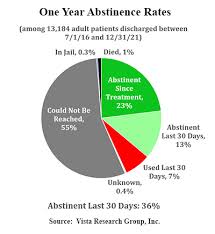
Rehab success depends on a range of factors, including treatment type, length of stay in rehab and an individual's level of commitment. While some may struggle to overcome addiction through rehabilitation programs, others excel and achieve long-term sobriety after successfully going through rehab.
People tend to perceive rehab success solely in terms of sobriety. This isn't always the case - success may also be judged based on improved relationships among family and friends as well as ability to contribute back into communities in a meaningful way. Therefore, it is crucial that rehabs offer holistic therapy options like 12-step programs.
Studies have indicated that those undergoing rehab for 90 days or longer are more likely to achieve their treatment goals. This doesn't have to mean residential treatment for 90 days in full; at least some form of addiction treatment should continue at least that long.
Even with high success rates at some rehabs, it is essential to remember that recovery is an ongoing journey and that not everyone will meet their drug or alcohol rehab success goals. Relapsing does not invalidate rehab as an effective method; rather, it means they require alternative or additional therapies in order to remain sober.